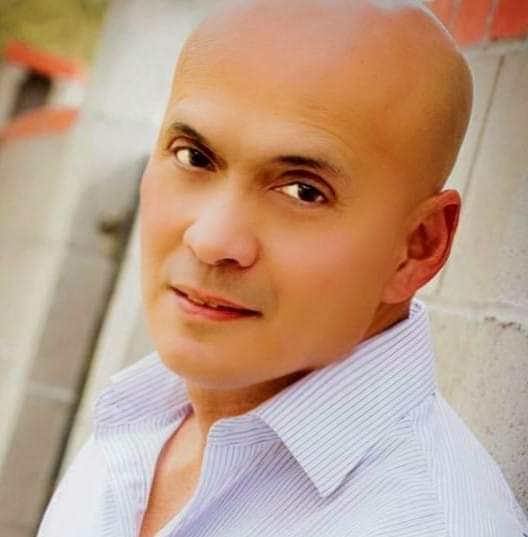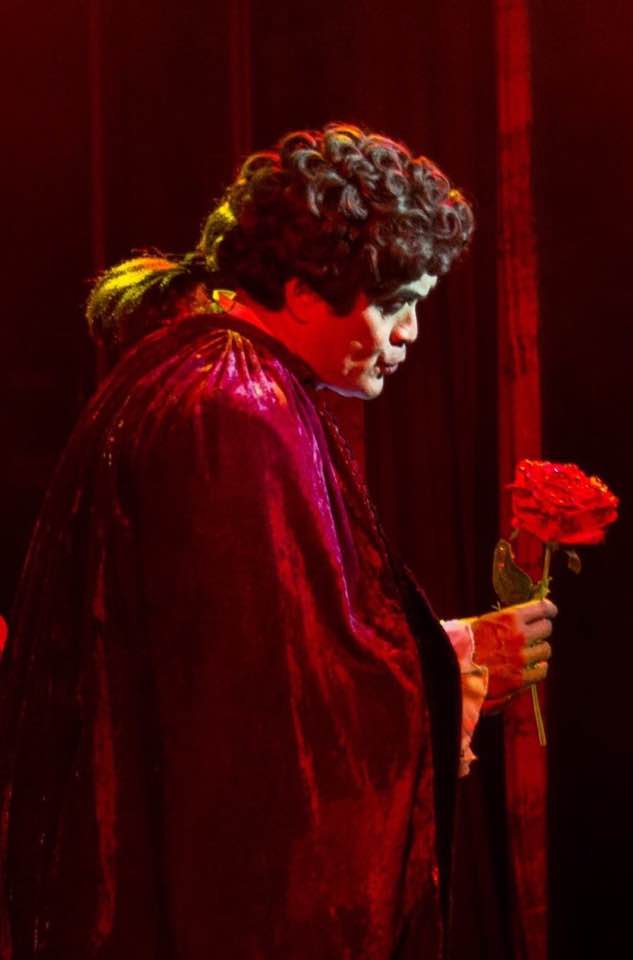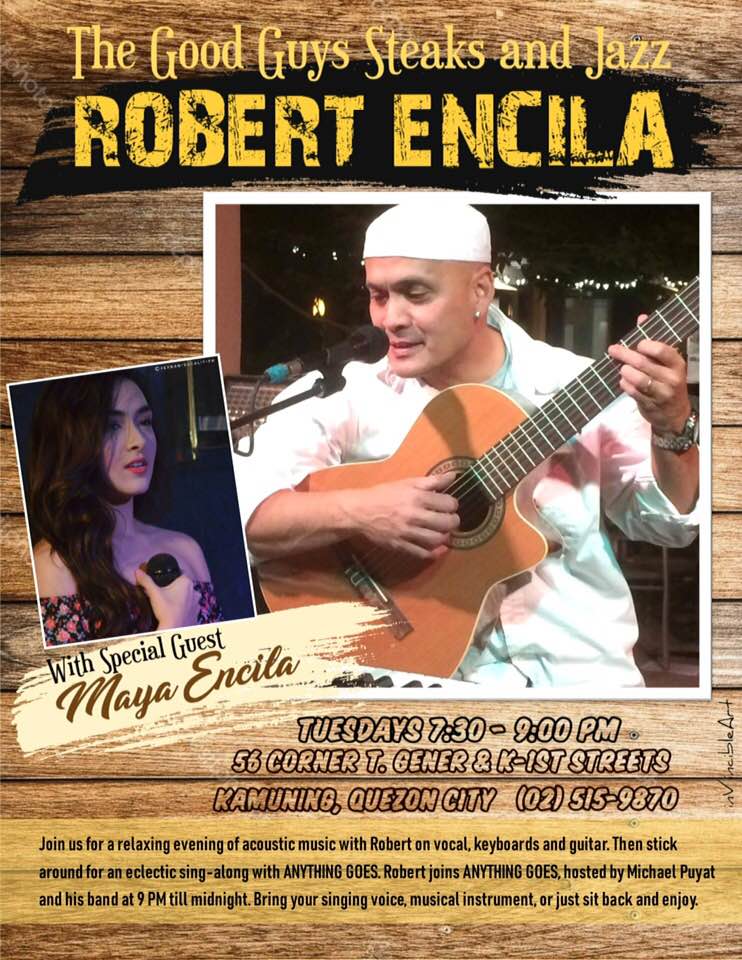Interview: Robert Encila - Heart and Soul

photo by Maria Alburtus
ROBERT ENCILA is a singer, actor, director, and an alumnus of
the University of Arizona Theatre Program. A certified drama teacher, he recently returned to Tucson after a four-year sabbatical in his native Philippines. He toured the islands as an actor and music director for Philippine Stagers Foundation; performed as a front
man of a five-piece jazz ensemble; and reviewed theatre productions for Broadway World Philippines while managing the budding theatre career of his teenage daughter, Maya Encila, a triple-threat performer who starts her conservatory training this fall at Circle in the Square Theatre School in New York City. A former founding artistic director of Studio Connections of Arizona, where he developed a successful theatre program for teens and young adults, Robert is back to work with young people as he leads the Drama Department at Sunnyside Unified School District.
His profile and reviews can be found on the BWW website. I interviewed him in 2014 (Robert Encila - Theatrical Alchemist), after seeing his production of A Man of No Importance. I was struck by his personal depth, in addition to his considerable artistic talent and ability.

Repertory Philippines' production of Beauty and the Beast.
Photo by Erica Feliz-Martinez Jacinto
Jeanmarie Simpson: Wow, Robert. I just looked at your BWW Philippines writing. What a renaissance man you are - seems as if there's nothing you can't do. Please tell us about your recent sojourn to your native land.
Robert Encila: I went back to live in the Philippines with my teenage daughter, Maya. It was really a chance for her to gain cultural and language immersion, having grown up in the States without much exposure to that part of her identity. The plan was to take a one-year sabbatical for me while she took a year of high school to study abroad. But we ended up staying for four years. She got involved in the theatre scene, touring and performing in various venues all over the country. I too got involved, both as her manager and part-time music director in some of the productions. I saw a lot of excellent shows and I found myself reviewing a lot of them for Broadway World Philippines. It was a challenging and satisfying four-year experience.
What are you up to these days?
I am becoming an introvert in my older years. I'm not sure how that works exactly, because I've considered myself so "out there" for the bulk of my life. But these days I want nothing more than retreating to my proverbial cave, reading a good book, and spending quiet time raising chickens in my backyard.
Now that you're spending quiet time in your cave with your books and chickens, are there things looking back you'd do differently?
Probably pursue my original passion of living in New York City and performing on Broadway, which at one point I was ready to do right after college. But teaching got a hold of me and I fell in love with it. Just as well, actually, because I wouldn't have met Ginny and would never have known the joy of raising my three awesome daughters. In a way, Maya moving to New York to study musical theatre in a professional environment kind of fulfills that old dream of mine.

Robert Encila and his daughter Maya did
at restaurants and jazz bars during their
4 years together in the Philippines.
Poster artist, Vincent Layson Vicentuan
It's hard for me to imagine you not getting along with anyone, but theatre is a wild and whirling world. Can you talk about a time you encountered difficulty with other artists?
I can think of several occasions. But I remember this one experience--I was an actor in a production where I had to work with a director who cared nothing about actors' input. This person was a classic Type A, controlling type and had everything planned and pre-ordained (which is a good thing to an extent), but I still struggle watching directors in a professional setting give line readings and specific movement, with little regard to character nuance or a playwright's subtext. (I struggle with literalism, period.) I recall feeling shamed in front of the cast because I was so tense and allegedly didn't "follow" directions, which then left me feeling insecure and questioning my own ability and intelligence. There's really only one way to address something like that. I went to see the director the following day, an hour before rehearsal, and voiced my sadness and frustration (without calling this person out as a horrible director, of course). To my pleasant surprise, this director was very open and let me negotiate acting choices as I saw them. I've learned that people can be a lot more flexible in one-on-one situations, and one way I've learned to achieve that kind of relating is to use the good old "I-messages" while affirming the other person for their efforts and dedication.
I stand amazed at your ability to navigate the rough terrain in life, especially theatre. I'm curious about whether your considerable skills have ever let you down.As a teacher and a director, I believe my greatest asset is the ability to empower students into positions of leadership. That means I have to risk a certain comfort level to allow them to fail once I've given them an opportunity to step up. And sometimes that means trusting students to get the job done even when your eyes aren't fully on them at all times. Let's face it, in this business you can't see everyone at all times. In a production setting, for instance, some people run the tech booth, others are in charge of front-of-the-house stuff, others are backstage, and so forth. I'm talking about a student-run production, of course, where the buck still stops with me when things go awry. Many years ago, during one tech rehearsal, I had an actor fall offstage and into the orchestra pit because of a missed cue on the part of the stage manager and the lighting operator. I was way back in the house taking notes. That student had to be rushed to the hospital. He came back two days later with a neck brace and I thought, "This is it, my career is over." Fortunately, he managed to get healthy in time to do the next production as the injury proved to be less serious than I had feared. Much to my surprise, the parents were so cool about it and didn't make much of the incident. The school dodged a bullet there because it could have been much worse for everyone involved. Now I make sure to have adequate parent participation on these occasions.
.jpg)
David Henry Hwang, in Manila
JS: From where I'm sitting, it looks as if you have been wildly successful professionally, as an artist. But that doesn't seem to be your greatest point of pride. What do YOU consider your greatest accomplishments?
As a performer, getting my Equity card with Arizona Theatre Company. As a teaching artist, my 12-year stint as a founding director of Studio Connections and creating a vibrant theatre company from the ground up. I thought I did a decent job staging Sunday in the Park with George at the high school level many moons ago. Great talent at the right place at the right time. I'd love to do that again at the professional level. It's one of my favorite pieces - haunting music, lovely yet terribly flawed characters, mesmerizing content, and spectacular stagecraft. Sign me up.
I am proud of my influence in young people's lives. I love to see former students succeeding in their various fields. There's a Hollywood director, a published playwright, a novelist, an independent film producer, a progressive politician, a trial lawyer, and a doctoral student in Anthropology who credits my acting classes for his continued inspiration. Many others are not even in theatre-related fields, but to this day I still get a heartwarming message of love and gratitude for my role in shaping their minds. I consider that my greatest success.
Okay, well - you didn't burst full-grown from your father's forehead, though you are SO amazing it's hard to imagine you anything but mature and accomplished. But you were once a young, budding humanoid - what were your big challenges starting out?I had severe, undiagnosed attention deficit disorder. I was extremely creative but struggled with staying the course, as it were. I was self-medicating and dropped out of school and ran away from home. I discovered professional theatre along the way, which helped identify what I wanted for a future but I was too troubled and "parentless" to make much progress. I was lucky to have an angel in my life named Janet Trever, who has since crossed the rainbow bridge. She basically took the reins as a surrogate mom and led me to a whole new discovery of the self-help culture and spiritual traditions: Twelve Steps, psychotherapy, and Eastern mysticism. She believed in me and pushed me to keep at it. Because of her, I mustered the strength to audition for a scholarship to study performing arts at the University of Arizona. Getting into that program on a full ride would shape my career and the rest of my life.
Now that you've got that career and huge swath of life behind you, can you share your favorite director - someone you've collaborated with most successfully by your definition?Easy answer: Barclay Goldsmith. Barclay was the founding artistic director of Borderlands Theater and former head of the theatre department at Pima Community College. He saw something in me as a young student at the University of Arizona and took me on as a regular actor for Borderlands. Watching Barclay at work is a trip. He doesn't talk much, asks more questions than he gives directions, yet somehow gets an actor to understand the process and achieve her arc. He can spot your tricks and knows how to redirect your attention without ever giving you a sense that you're going about it the wrong way. It's Socratic directing at its finest.
Another director I have really enjoyed working with is Eva Tessler, also from Borderlands and the Latina Dance Project. She gets so much process work done without pushing it. Being directed by Eva is like having a good conversation with a friend, and then before you know it you're in character doing deep work. The process is negotiated and you don't get the sense that her ego is ever involved.
What are you working on now?
As a matter of fact, I just finished an informal reading with Barclay and several actors the other night. I'm into devising lately. I also enjoy the process of seeing how short stories, for instance, can be transcribed into a dynamic piece of theatre. There's so much injustice and corruption in the world right now, and I feel like my best defense against mental decay from the daily political barrage is to create a collaborative community with like-minded artists. I don't have anything specific in terms of material at this point. But in terms of my daily work, I'm happy to say that I am back in the classroom teaching theatre and stagecraft. Young people are a source of hope and strength for me. That's where I go to feel better about the world. I may not be able to change the political arena, but I can help shape the future by pouring my heart and soul into my work with young people.
How is the American theatre looking these days? What's holding us back?
The same old challenge -- this blinkered attitude about the arts' overall impact on the educational system. We can placate a certain segment of society by providing "enrichment" courses in the arts, but it should no longer be a mystery that you can't achieve holistic education without a strong emphasis in the arts. The US Bureau of Economic Analysis recently released an astounding statistic that reports over $763 Billion of contribution by the arts sector to the US economy. That's around 5 million workers in the industry, which accounts for hundreds of billions of dollars in compensation. Yet here we are, still waiting for an increase in financial support for arts programs in the schools. You can talk about Broadway, Hollywood, and TV culture all day, but young people are tomorrow's audiences and we owe it to the industry to develop an enlightened culture of young participants and consumers of the arts.
Thank you, Robert. See you next time!
Comments

Videos

